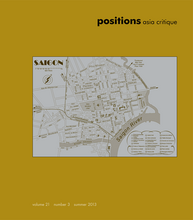
Abstract
This essay examines the discursive constellation of the concepts of sovereignty, coinage, and kinship from the Warring States Period to the first empires of the Qin and Han dynasties. Drawing upon philosophical texts, including the Lunyu, Mengzi, and Guanzi, as well as historical texts such as the Shang shu, Shi ji, and Han shu, I will argue that the foundational narrative for the emergence of coinage in China was inextricable from theories of both sagely and tyrannical sovereignties — an ideological ambivalence that was reflected in the discourse on coinage itself. The coin of the realm was the symbol of power and profit and thus of the political and the economic realities of empire. Yet imperial anxieties over political tyranny would lead classical political theorists to recode the minting of coin in terms of a moral discourse, one that was also instrumental in the moral legitimation of imperial sovereignty itself. This would be the discourse on kinship, which allowed theorists to equate the sovereign with the parent. Coinage, then, like sovereignty, would appeal to the language of kinship, and in this way would be translated from base tokens of material profit into symbols of the sovereign’s beneficent concern.